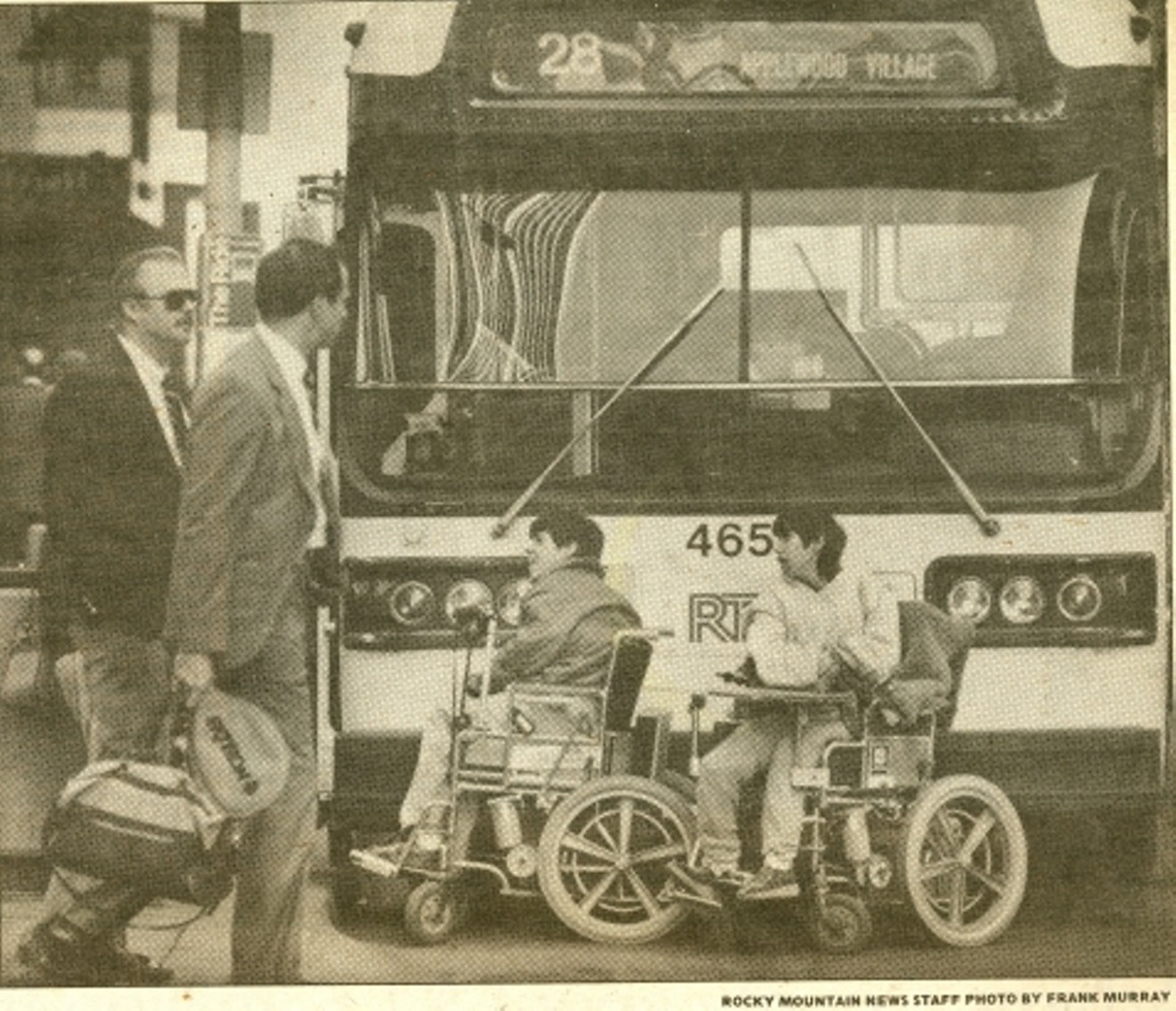Forty-three years ago this month, a Regional Transportation District driver stopped his bus at the intersection of Colfax Avenue and Broadway to pick up more riders. Before the bus could move on, people in wheelchairs rolled in front of the vehicle. Minutes later, another RTD bus traveling along the same route pulled up behind the first bus, and more people in wheelchairs rolled behind this second bus. Both buses were locked in, bringing traffic in a busy Denver intersection to a standstill. While the buses spent the next 24 hours locked in place, the nineteen protesters chanted, "We will ride!"
Disability-rights history changed forever.
A new documentary highlights the "Gang of 19" protesters who blocked the buses on July 5, 1978. Made by the Denver Office of Storytelling, "30 Years Later: How the ADA enabled Denver’s Disability Community to ‘Boldly Go Where Everyone Else Has Gone Before’" captures that huge moment in disability-rights advocacy, and details how it pushed public transport agencies across the country to make their buses accessible.
"Most of them are gone. I don’t think any of them are still in Denver," Rowena Alegria, Denver's chief storyteller, says of the Gang of 19. "We found other folks who were just part of the movement or helping them in some way and went out and talked to them about what it took to get the [Americans With Disabilities Act] passed, what role Denver played in helping bring that issue to the forum."
The 26-minute film, which was nominated for a Heartland Emmy, includes interviews with some of the key people who supported the Gang of 19, including Barry Rosenberg, co-founder of Atlantis Community, an independent-living center for people with disabilities, who helped organize the protest more than forty years ago.
"No one knew what to do. The drivers couldn't go anywhere. They got out of the buses. And very shortly the police came," Rosenberg says in the film.
Also featured in the short documentary is John Holland, who filed a lawsuit against RTD on behalf of Atlantis that eventually resulted in a settlement that led the agency to retrofit over 200 of its buses with wheelchair lifts.
Both the Gang of 19 protest and the legal victory helped raise awareness about the lack of opportunities for people with disabilities. "That effort here in Denver helped to put [the issue] in the headlines again and get people to pay attention in a way that they hadn’t before," says Alegria.
On July 26, 1990, a dozen years after the Gang of 19 rolled into Denver's streets, Congress passed the Americans with Disabilities Act, which prohibits discrimination against individuals with disabilities in all areas of public life.
Alegria's office started working on the film last year, on the thirtieth anniversary of the passage of that act. In addition to Rosenberg and Holland, the film shares interviews with disability-rights advocates in Denver today, including Julie Reiskin, executive director of the Colorado Cross-Disability Coalition, and André van Hall, a photographer who became blind as an adult. "He had to just reinvent his life. He talked to us a lot about how technology has helped him to do his work," says Alegria.
To mark the 31st anniversary of the Americans With Disabilities Act — as well as the 43rd anniversary of the Gang of 19 — Denver Film is offering a free virtual screening of 30 Years Later, followed by an hour-long pre-recorded panel talk with Reiskin, van Hall and others. The package will be available starting at 7 p.m. Friday, July 23, through 11:45 p.m. Monday, July 26. See it on Denver Film's Virtual Cinema platform, available at denverfilm.org, or by downloading the Denver Film app for Roku TV or Apple TV.
[
{
"name": "Air - MediumRectangle - Inline Content - Mobile Display Size",
"component": "12017618",
"insertPoint": "2",
"requiredCountToDisplay": "2"
},{
"name": "Editor Picks",
"component": "17242653",
"insertPoint": "4",
"requiredCountToDisplay": "1"
},{
"name": "Inline Links",
"component": "18838239",
"insertPoint": "8th",
"startingPoint": 8,
"requiredCountToDisplay": "7",
"maxInsertions": 25
},{
"name": "Air - MediumRectangle - Combo - Inline Content",
"component": "17261320",
"insertPoint": "8th",
"startingPoint": 8,
"requiredCountToDisplay": "7",
"maxInsertions": 25
},{
"name": "Inline Links",
"component": "18838239",
"insertPoint": "8th",
"startingPoint": 12,
"requiredCountToDisplay": "11",
"maxInsertions": 25
},{
"name": "Air - Leaderboard Tower - Combo - Inline Content",
"component": "17261321",
"insertPoint": "8th",
"startingPoint": 12,
"requiredCountToDisplay": "11",
"maxInsertions": 25
}
]












